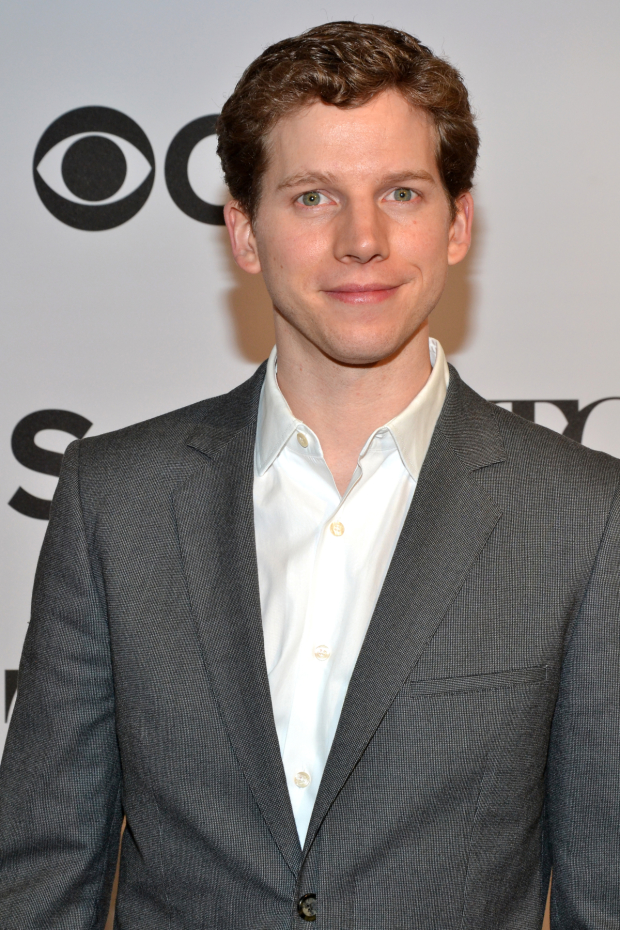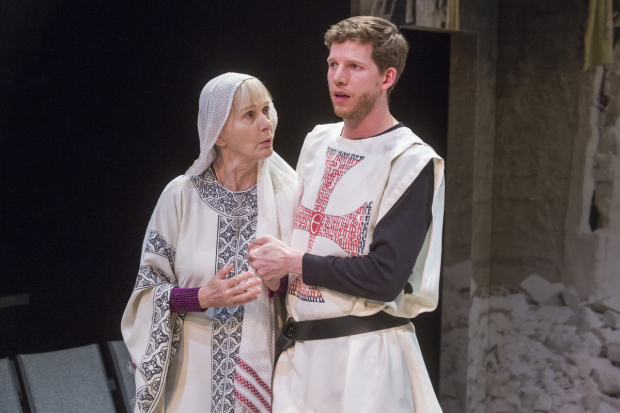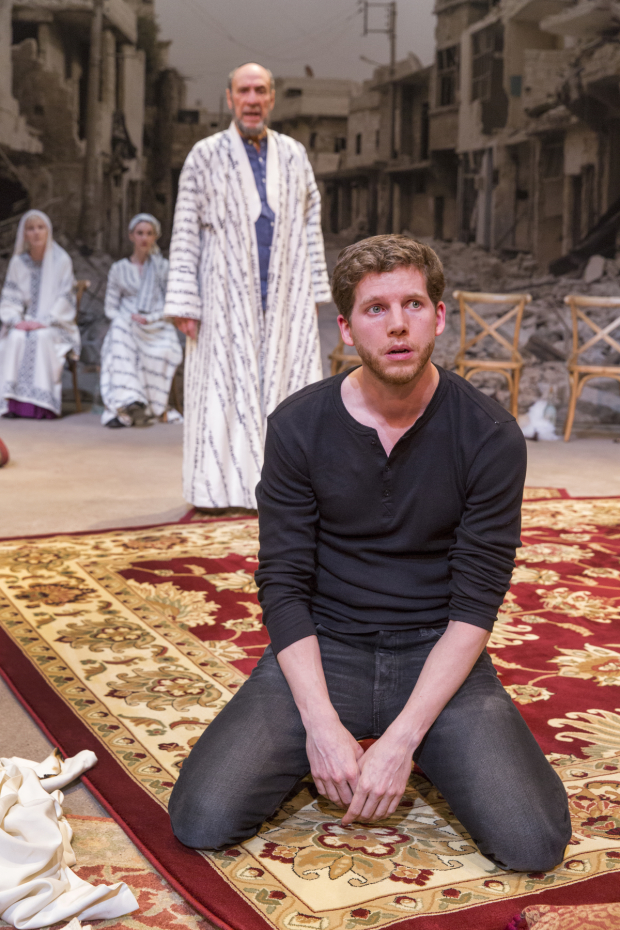After Kinky Boots and Minority Report, Nathan the Wise Is Stark Sands' Dream Job
Two-time Tony nominee Stark Sands, who's been away from the New York stage since leaving his starring role in Kinky Boots in early 2014, is finally returning to his theater roots. Following a season-long stint as the lead in Fox's series adaptation of the 2002 film Minority Report, Sands is now back onstage in Classic Stage Company's production of Gotthold Ephraim Lessing's 1779 work Nathan the Wise. The philosophy-tinged play is a far cry from the sparkly, stilettoed catharsis of the musical Kinky Boots and the television sci-fi drama of Minority Report, but for Sands, the role is a dream come true.
"I'm generally tired these days," he says, explaining that he and his wife are new parents to a ten-month-old son, Griffin. "It's the best thing ever, but also quite exhausting, especially when I'm working at the same time." Nevertheless, Sands is always looking toward the next challenge, even while he can't take his eyes off his son.
"It's becoming harder and harder to even walk out of the apartment because he's so lovely. I guess that's what life's about; though, you know, I wouldn't want to just give it up. I want to show him that hard work is very rewarding as well."

(© David Gordon)
What made you return to the stage?
I wanted to do something that I could dig into. [Minority Report] was the hardest I've ever had to work. It was a really rewarding experience and I'm happy to have had it. But I also missed my family a lot. It was about fifteen to nineteen hours a day. And the baby was six weeks old when I started, so it was awesome and exhausting and enlightening. I never got a full night's sleep out there, never. And the funny thing is when it was at its hardest and when I was working so much and missing my family so much, I sort of dreamed about this dream job.
What aspects of this job were you dreaming about?
[I thought] I would love to do a play and I would love to do a play that's so close to home that I can walk from my apartment. There's no rehearsal time on a TV show, really. You just show up and you do the scene the way that you imagined it on the first try. But I know from doing theater, working through plays for weeks at a time that you discover things in like, week three, week five, week nine of the run that you just can't get to on the first day. So I really wanted to dig into something challenging like that, and there isn't anything that compares to doing something live every night where you can just continue to grow and learn and sort of sink into the part.

(© Richard Termine)
Tell me about the premise of the play.
F. Murray Abraham plays Nathan the Wise. He's a Jewish merchant. He lives in Jerusalem at a time when there was an uneasy peace between the Christians, the Muslims, and the Jews, just following the third crusade, [where] the Christians to try to conquer Jerusalem and win it back. They ended up in sort of a stalemate and that's when the story takes place. [Nathan] is known as the wisest man in town, and also the richest man in town because he travels all over the world selling his wares and obtaining his wares. So, the story begins, Nathan comes home from one of his travels and learns that his daughter has been in a fire in their home and was rescued from the fire by this Knight Templar, me, who as soon as he rescued her, immediately sets her down and walks off and doesn't come back. It's this big mystery why this guy wouldn't want to be thanked. So Nathan seeks him out and you discover that I didn't realize that I was saving a Jewish person and that I might not have done it if I knew who I was saving.
The third representative of a religion is the sultan, Saladin, who represents the Muslim religion. The sultan is lacking for money and he hears that this Nathan the Wise has come back and he's very rich. So he decides to trick Nathan and ask him an unanswerable question, which is: Of these three major religions, Christianity, Islam, and Judaism, which one is most enlightening, which one is best? And he answers it in telling this beautiful parable.
What is it like to play such a misguided character?
My character is, on the surface, something that was in my wheelhouse. He's a soldier. I've played a soldier a bunch of times. But he's a soldier in 1192. And what I discovered in rehearsals is it's clear that my character's very, very angry and I have a lot of hate. I am the angry Christian who's stomping around yelling pretty horrible things about other religions. That's what's on the page. I'm obligated to say it, but I can feel the audience genuinely against me at the beginning, and I'm not used to that. I'm used to being the likable character. That's not what happens in this play. I might have to just live with being the guy who they don’t like [and] it's really hard.
How did this play come to be?
The play wasn't actually ever meant to be performed for an audience. The playwright, Gotthold Ephraim Lessing, was also a bit of a philosopher, and this was back in the 1780s. He wanted to ask questions [like], "These three religions all stem from the same God. So if they all worship the same God in the end, which of these religions is God's favorite?" But it was blasphemous to ask that question in his essays that he was writing. The church was shutting him down. And he realized that if he put his ideas into a play, that they wouldn't be able to censor him. Originally, if it were performed it would have been five hours long. Edward Kemp, our translator, has cut it down to what it is now, which is about two hours. So because it's cut and it wasn't really written to be acted onstage, there are some really challenging things that we're being asked to do. It's exactly what I wanted. I wanted to do something that was really hard and that made me work, and made my brain work.

(© Richard Termine)











